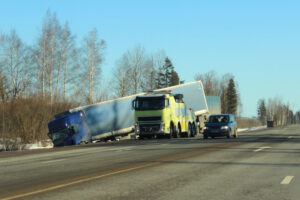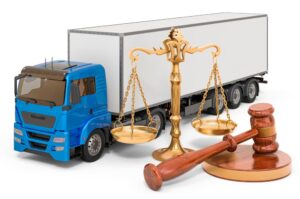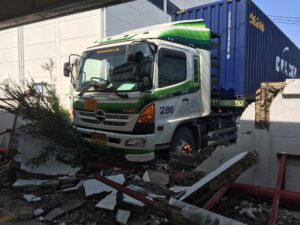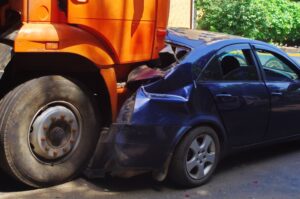What Evidence Do You Need for a Successful Truck Accident Claim in Seattle?
Truck accidents are among the most devastating types of motor vehicle collisions, often resulting in catastrophic injuries, significant property damage, and even loss of life. Given the size and weight disparity between commercial trucks and passenger vehicles, the aftermath of a truck accident can kill victims.
Those seeking compensation need a lawyer who understands the evidence required for a successful truck accident claim. Evidence for trucking collision cases can require a lawyer to locate and gather. Still, a skilled Seattle truck accident lawyer can determine the most helpful evidence and use it to build and strengthen your case.
Background on Truck Accidents
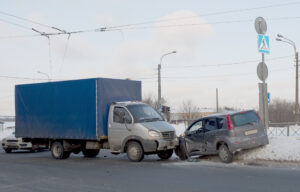
Truck accidents vary greatly from other collisions, like those between two passenger vehicles. Understanding the key details of truck accidents can allow us to recognize the importance of evidence further.
Common Causes of Trucking Collisions
Commercial trucking accidents occur for various reasons, sometimes involving a mix of human error, mechanical issues, and external conditions.
Common causes of these collisions include:
- Driver fatigue: Long hours behind the wheel, often violating federal hours-of-service (HOS) regulations, can lead to exhaustion and impaired decision-making.
- Distracted driving: Truck drivers may let ] texting, navigation systems, or eating distract them from driving.
- Speeding: Trucks require more time and distance to stop, making speeding especially dangerous.
- Improper maintenance: By law, commercial trucks require regular inspections and maintenance. Faulty brakes, worn tires, or other unaddressed mechanical issues can cause catastrophic accidents.
- Overloading or improper loading: How a driver loads cargo on a commercial vehicle greatly affects safety. Excessive or unevenly distributed cargo can affect a truck’s balance and handling, resulting in accidents.
- Adverse weather conditions: Bad weather, including Seattle’s frequent rain and slippery roads, often exacerbate the risk of accidents.
- Substance use: Driving under the influence of alcohol or drugs, even prescription medications, can impair a truck driver’s abilities.
- Hazardous road conditions: Potholes, uneven roads, and inadequate lighting, among other hazards, can substantially contribute to truck crashes.
Identifying the cause of a truck accident can establish liability. Still, knowing exactly what caused a crash may require extensive investigation.
Injuries from Truck Accidents
Due to the force of impact, truck accidents often result in severe injuries. The injuries victims suffer depends on the vehicles’ speed and the impact’s location.
Some of the typical injuries include:
- Head and brain injuries
- Spinal cord injuries and paralysis
- Broken bones
- Lacerations
- Burns
- Internal injuries or bleeding
- Crush injuries
Commercial trucking accidents can also cause psychological issues, including depression and post-traumatic stress disorder. Mental and emotional troubles can have a significant impact on a person’s life and well-being.
You need evidence proving the type of injuries you sustained, the severity of your harm, and the ways your injuries have and will affect your life. This helps you secure proper compensation to alleviate related burdens and continue receiving necessary treatment and rehabilitation.
Liability for Commercial Truck Crashes
One of the most complex but important details concerning truck accidents is liability.
Multiple parties can bear liability for trucking collisions, like:
- The truck driver: If negligence, such as speeding or distracted driving, caused the accident, you can hold the truck driver responsible.
- The trucking company: If improper training, hiring practices, or maintenance contributed to the collision, the company can share the responsibility for a crash.
- Cargo loaders: When improper loading contributes to a truck accident, the parties responsible for loading the truck can be held liable.
- Vehicle manufacturers: Vehicle manufacturers, as well as designers, retailers, and distributors, can bear liability if a defect or malfunction causes a truck accident.
- Third-party maintenance providers: If inadequate inspections or repairs cause a commercial truck crash, you can hold the maintenance providers accountable for their actions.
- Government entities: Hazardous, poorly maintained roads are usually the responsibility of certain governmental entities, which may share in the responsibility of a truck collision.
Determining liability is necessary to help ensure all negligent parties are held accountable for wrongdoing. Evidence can help determine and establish liability, getting you one step closer to securing the financial recovery you deserve.
Why Are Truck Accident Cases So Difficult to Navigate?
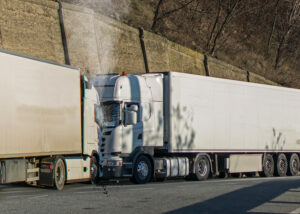
Truck accident claims are usually more complex than typical car accident cases, as there are numerous details to consider.
Some of these complications include:
- Regulatory compliance: Federal and state laws heavily regulate commercial trucking, including those set forth by the Federal Motor Carrier Safety Administration (FMCSA). Violations of these regulations can affect liability.
- Multiple parties: Identifying all liable parties and determining their degree of fault plays a large role in your case.
- Insurance companies: Trucking companies and their insurers often have significant resources and legal teams dedicated to minimizing payouts, making it a bit more difficult to get adequate financial recovery in some cases.
- Evidence preservation: Key evidence, including data and records, may be lost or destroyed without timely action. This is one of the major reasons for acting quickly following a truck accident.
- High stakes: Due to the severity of injuries and damages, trucking companies and insurers aggressively defend against claims to limit their financial exposure.
The complicated nature of truck accident cases further highlights the need for strong legal representation. Having an attorney handle your case puts you in a much more favorable position, as these lawyers have the skills and experience to gather pertinent evidence, build your case, and obtain the justice you deserve.
The Importance of Evidence in Truck Accident Cases
Evidence is the cornerstone of a successful truck accident claim. Without sufficient proof, establishing liability and securing fair compensation becomes nearly impossible.
The burden of proof lies with the plaintiff, meaning you must demonstrate that the at-fault party’s negligence caused the accident and your resulting damages.
A seasoned truck accident attorney understands the great need for strong evidence. Therefore, when you hire a lawyer, they put a significant effort into finding and securing the evidence your case needs.
Types of Evidence Most Helpful for a Successful Truck Accident Case in Seattle
For Seattle truck accidents, numerous pieces of evidence can impact a case. Some of the evidence most commonly used in successful truck accident cases include:
Police Reports
A police report provides an official account of the accident, including:
- Important details, including the time, date, and location
- Initial findings of fault
- Diagram of the accident scene
- Any citations issued to drivers
When police officers report to an accident scene, they immediately gather information. Subsequently, they put this information into an official report. You or your attorney can obtain a copy to use for your case.
Event Data Recorder (EDR) Data
Commercial trucks contain event data recorders (EDRs) that record critical details about a truck. Data from an EDR (also called a black box) can reveal information helpful to a case, such as the speed of the truck driver during the crash.
Dashcam or Surveillance Footage
Video evidence can provide a clear picture of the events leading up to the collision, the accident itself, and traffic and weather conditions at the time of the crash. Your attorney can find cameras and obtain footage to review for your case.
Truck Maintenance Records
Maintenance logs can be particularly important. They can reveal whether the truck was properly working during the collision or if negligence in upkeep contributed to the incident. These logs may uncover missed repairs or maintenance that can have prevented the crash, strengthening your liability case.
Cargo Records
Cargo loaders must keep certain records. These records can determine if they overloaded or improperly loaded the truck, affecting its stability. By reviewing these documents, your attorney can uncover potential violations that may have contributed to the accident.
Witness Statements
Sometimes, there are witnesses to a crash. Eyewitness accounts can provide key details about the truck driver’s behavior, traffic conditions, and the actions of other involved parties.
Professional Testimony
Sometimes, a truck accident lawyer may rely on professional help when building a case. Expert witnesses, such as accident reconstruction specialists, can recreate the accident, analyze vehicle damage, and provide insights into the cause of the collision.
Medical Records
Comprehensive medical documentation is essential to establishing the extent of your injuries, definitively linking your injuries to the accident, and calculating the costs of treatment and future care. Medical records are some of the most valuable evidence, especially when extensive, life-altering injuries occur.
Employment and Training Records
A truck driver’s employment and training can contribute to an accident. These records can reveal certain details, including whether a qualified and properly trained trucker drove the truck and any history of negligent behavior or prior violations.
Photographic Evidence
Photos of the accident scene, vehicle damage, and injuries can support your account of the events and demonstrate the collision’s severity. These images serve as important evidence, helping to establish the impact and further strengthening your case.
The Benefits of Working with a Truck Accident Lawyer
Given the complexities of truck accident cases, working with an experienced attorney can significantly improve your chances of success.
Key benefits of having a lawyer on your case include:
- Investigation and evidence gathering: Attorneys have the resources and experience to collect critical evidence, including subpoenaing records from trucking companies.
- Navigating legal and regulatory issues: A lawyer understands the applicable state and federal regulations and can use violations to bolster your claim.
- Negotiating with insurers: Attorneys are skilled in dealing with insurance companies and can counter tactics designed to undervalue your claim to get the damages you deserve.
- Professional network: Lawyers often have access to a network of professionals, such as accident specialists and medical professionals, to strengthen their case.
- Litigation experience: If a fair settlement doesn’t happen, a lawyer will represent you in court to continue pursuing maximum compensation.
In addition, having strong legal representation can ensure you feel more confident throughout the process and allow you the peace of mind you need during a trying time.
Few understand the challenges that arise after a truck accident better than an attorney. Your lawyer will do everything possible to support and guide you while aggressively seeking justice and financial recovery.
Why You Should Seek Legal Representation Right Away After a Truck Accident

Truck accident cases are not only complicated but also high-stakes. Victims face mounting medical bills, lost income, and long-term physical and emotional suffering. Hiring a personal injury attorney to fight against powerful trucking companies and their insurers is always best. Do it as quickly as possible.
By seeking legal representation, you gain an advocate who will protect your rights and interests, handle all legal aspects of your case, and maximize your compensation. Parties properly represented do not leave themselves vulnerable to the insurance company tactics.
The sooner you seek legal help, the better it is for your case. Time is limited to take action following a truck accident, especially with strict statutes of limitations. Missing important deadlines can negatively impact your ability to get the compensation you deserve.
Therefore, schedule a consultation with a local truck accident attorney as soon as possible to begin working on your case. Early action can help preserve important evidence and strengthen your claim for the best possible outcome.
A Seattle Truck Accident Attorney Can Gather Evidence of Your Collision and Use it For Your Benefit
Truck accidents in Seattle often result in severe injuries and convoluted legal battles. Understanding the evidence required for a successful claim is critical, but obtaining this evidence and navigating the legal process can be daunting.
Fortunately, you don’t have to do it on your own.
An experienced Seattle personal injury attorney will thoroughly investigate your case, your rights are protected, and you have the best chance of securing the compensation you need. If you or a loved one suffered from a truck accident, seek legal representation right away to start your journey toward justice and recovery.
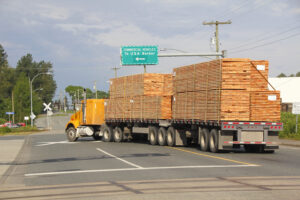


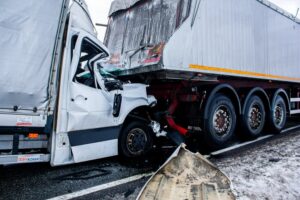



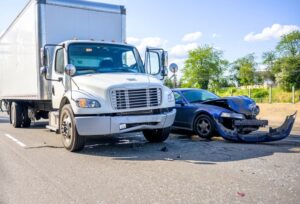 Each semi-truck accident claim and lawsuit is independent of the other. You cannot rely on the timeline for other cases to project how long yours might take to conclude. Several factors may influence the time it takes to secure a settlement or verdict, which include:
Each semi-truck accident claim and lawsuit is independent of the other. You cannot rely on the timeline for other cases to project how long yours might take to conclude. Several factors may influence the time it takes to secure a settlement or verdict, which include: Let an attorney oversee the claims process and any lawsuit you need to file. Your attorney and their team will:
Let an attorney oversee the claims process and any lawsuit you need to file. Your attorney and their team will:
